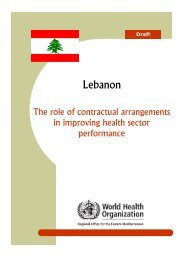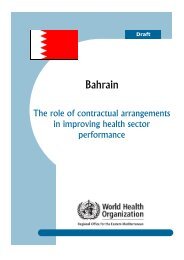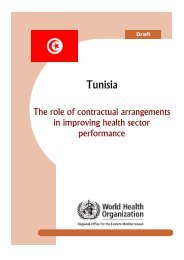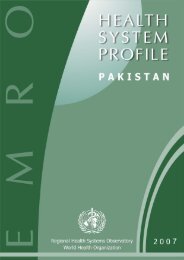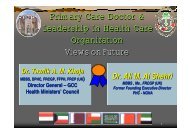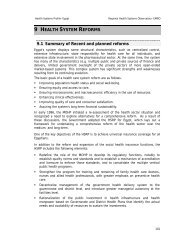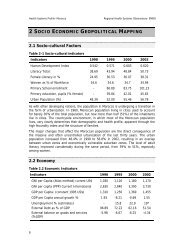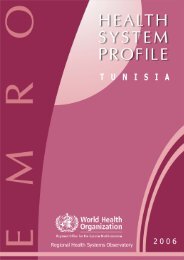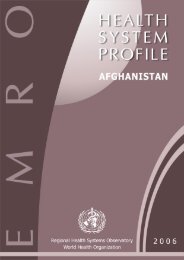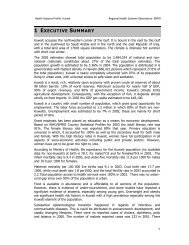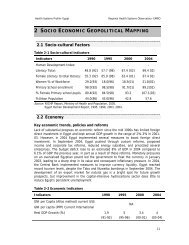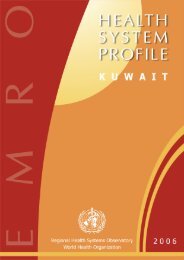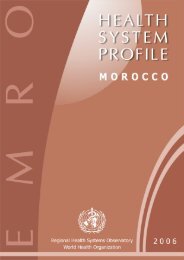The role of contractual arrangements in improving health sector ...
The role of contractual arrangements in improving health sector ...
The role of contractual arrangements in improving health sector ...
You also want an ePaper? Increase the reach of your titles
YUMPU automatically turns print PDFs into web optimized ePapers that Google loves.
Lebanon<br />
postnatal care, vacc<strong>in</strong>ation and other reproductive <strong>health</strong> services, such as family plann<strong>in</strong>g<br />
and <strong>in</strong>fertility services. <strong>The</strong> centre receives a capitated fee per pregnant woman for antenatal<br />
visits and a capitated fee per delivery. This is the only contract that <strong>in</strong>volves monetary cash<br />
flow with a local nongovernmental organization <strong>in</strong> Lebanon. It is too early to assess this<br />
<strong>contractual</strong> project but several aspects <strong>in</strong>vite optimism that it represents a useful model for<br />
other M<strong>in</strong>istry <strong>of</strong> Public Health contracts: the clear terms <strong>of</strong> reference, <strong>in</strong>clud<strong>in</strong>g<br />
performance <strong>in</strong>dicators, adequate staff<strong>in</strong>g, tra<strong>in</strong><strong>in</strong>g <strong>of</strong> personnel, and the <strong>in</strong>terest with<strong>in</strong> the<br />
M<strong>in</strong>istry <strong>of</strong> Public Health <strong>in</strong> pilot and <strong>in</strong>novative projects <strong>of</strong> a limited scope than can be later<br />
expanded.<br />
• Contracts with <strong>in</strong>dividuals. <strong>The</strong> M<strong>in</strong>istry <strong>of</strong> Public Health contracts on an as-needed basis<br />
with <strong>in</strong>dividuals to deliver certa<strong>in</strong> consultative or operational services. This is done<br />
especially <strong>in</strong> areas with <strong>in</strong>adequate staff<strong>in</strong>g, for example <strong>in</strong> reproductive <strong>health</strong>. <strong>The</strong>re is no<br />
dedicated reproductive <strong>health</strong> programme at the M<strong>in</strong>istry <strong>of</strong> Public Health, and therefore the<br />
M<strong>in</strong>istry contracts periodically with public <strong>health</strong> experts to provide programmatic-like<br />
services <strong>in</strong> this area. Contracts are typically awarded to known qualified people rather than<br />
based on an open process that <strong>in</strong>volves competitive applications. Payments are typically<br />
based on cash transfers upon meet<strong>in</strong>g the terms <strong>of</strong> reference for the contract. <strong>The</strong>re has not<br />
been an assessment <strong>of</strong> the quality <strong>of</strong> outcomes <strong>of</strong> these contracts, but the M<strong>in</strong>istry <strong>of</strong> Public<br />
Health sees such contracts as allow<strong>in</strong>g it to secure public <strong>health</strong> expertise, which is abundant<br />
<strong>in</strong> Lebanon, at reasonable costs without the need to enlarge its pr<strong>of</strong>essional body.<br />
• Contracts with <strong>in</strong>ternational organizations. <strong>The</strong> M<strong>in</strong>istry <strong>of</strong> Public Health contracts with<br />
<strong>in</strong>ternational organizations operat<strong>in</strong>g <strong>in</strong> Lebanon to achieve certa<strong>in</strong> public <strong>health</strong> goals.<br />
Contract<strong>in</strong>g with UNICEF has already been discussed. <strong>The</strong> M<strong>in</strong>istry also contracts with the<br />
country <strong>of</strong>fice <strong>of</strong> WHO to support several programmes such as the national tobacco control,<br />
noncommunicable disease, and AIDS control programmes. Typically, the M<strong>in</strong>istry <strong>of</strong> Public<br />
Health provides the bulk <strong>of</strong> the f<strong>in</strong>ancial support for these programmes (around 70% if only<br />
cash support is considered but up to 90% if <strong>in</strong>direct costs are also considered) while WHO<br />
contributes the rest. WHO adm<strong>in</strong>isters these programmes under a special “trust fund.” <strong>The</strong><br />
M<strong>in</strong>istry <strong>of</strong> Public Health gets these funds back <strong>in</strong> the form <strong>of</strong> expenditures on programme<br />
activities. WHO charges 13% for adm<strong>in</strong>ister<strong>in</strong>g the funds.<br />
<strong>The</strong> collaborative programmes allow for local expertise to be secured as valued public<br />
<strong>health</strong> pr<strong>of</strong>essionals are paid at WHO scale, which is higher than the MOPH pay scale. Thus,<br />
Lebanon is able to both reta<strong>in</strong> these pr<strong>of</strong>essionals and benefit from their experience. Programme<br />
staff are recruited by the WHO Representative but are usually proposed by the M<strong>in</strong>istry <strong>of</strong><br />
Public Health. However, this is subject to political and other considerations, which limits the<br />
usefulness <strong>of</strong> the open process <strong>of</strong> application and appo<strong>in</strong>tment. However, most <strong>of</strong> the staff have<br />
been <strong>of</strong> high quality and have undergone adequate tra<strong>in</strong><strong>in</strong>g by WHO. <strong>The</strong>refore, these contracts<br />
have allowed for the build<strong>in</strong>g <strong>of</strong> strong human resource teams. Nevertheless, consider<strong>in</strong>g that<br />
Lebanon is a small market that has abundance <strong>of</strong> qualified <strong>health</strong> pr<strong>of</strong>essionals and that many<br />
such pr<strong>of</strong>essionals have already had a lot <strong>of</strong> tra<strong>in</strong><strong>in</strong>g <strong>in</strong> public <strong>health</strong> through the different<br />
programmes, the M<strong>in</strong>istry <strong>of</strong> Public Health can probably handle these programmes on its own<br />
with some help from WHO on an as-needed basis.<br />
160



